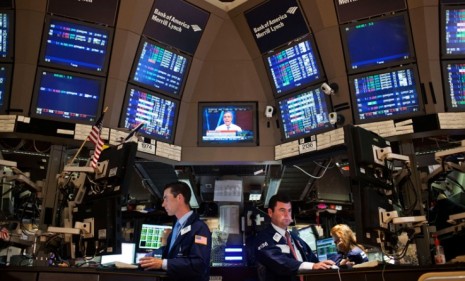Will the debt deal actually hurt the economy?
Washington might have figured out how to raise the debt ceiling before the government runs out of money. But will that spare Americans new financial pain?

A free daily email with the biggest news stories of the day – and the best features from TheWeek.com
You are now subscribed
Your newsletter sign-up was successful
Congress is rushing to pass a compromise deal to raise the debt ceiling and slash the deficit, hoping to get the agreement approved in time to beat tomorrow's deadline. If the effort succeeds, the danger of a government default will disappear, the government will be able to cover its bills through the 2012 election with no further debate, and the federal deficit will be cut by more than $2 trillion over the next decade. (See "The debt deal: Winners and losers.") But will the nation's economy really be any better off?
The deal is disastrous for the economy: The only good thing about this agreement is that it will "avert a catastrophic government default," says The New York Times in an editorial. "The rest of it is a nearly complete capitulation to the hostage-taking demands of Republican extremists." We're gutting programs for the poor just when they need them most. And cutting government spending now will prevent Washington from fighting unemployment, and "hinder an economic recovery."
"To escape chaos, a terrible deal"
The Week
Escape your echo chamber. Get the facts behind the news, plus analysis from multiple perspectives.

Sign up for The Week's Free Newsletters
From our morning news briefing to a weekly Good News Newsletter, get the best of The Week delivered directly to your inbox.
From our morning news briefing to a weekly Good News Newsletter, get the best of The Week delivered directly to your inbox.
This is the first step to restoring our financial house: The victorious Tea Partiers are disappointed they couldn't solve all the nation's financial problems in one bold stroke, says The Wall Street Journal in an editorial. But, "if the cuts hold, this would go some way to erasing the fiscal damage from the Obama-Nancy Pelosi stimulus." These aren't phantom spending cuts — the deal calls for an initial $900 billion deficit reduction. And we'll accomplish it without the job-killing tax hikes the Democrats wanted.
The U.S. could still face a painful credit downgrade: The credit rating agencies were calling for $4 trillion in cuts, says The Economic Times, and this deal falls short. If Moody's, Standard & Poor's, or Fitch downgrades U.S. Treasury bonds from their sterling AAA rating, we could be in for a "painful spike in borrowing costs for both Washington and Americans overall." So hold your applause until you see how this deal affects mortgage and credit card interest rates.
"US debt deal helps dodge default but not downgrade: Analysts"
A free daily email with the biggest news stories of the day – and the best features from TheWeek.com
-
 ‘Those rights don’t exist to protect criminals’
‘Those rights don’t exist to protect criminals’Instant Opinion Opinion, comment and editorials of the day
-
 Key Bangladesh election returns old guard to power
Key Bangladesh election returns old guard to powerSpeed Read The Bangladesh Nationalist Party claimed a decisive victory
-
 Judge blocks Hegseth from punishing Kelly over video
Judge blocks Hegseth from punishing Kelly over videoSpeed Read Defense Secretary Pete Hegseth pushed for the senator to be demoted over a video in which he reminds military officials they should refuse illegal orders
-
 The billionaires’ wealth tax: a catastrophe for California?
The billionaires’ wealth tax: a catastrophe for California?Talking Point Peter Thiel and Larry Page preparing to change state residency
-
 Bari Weiss’ ‘60 Minutes’ scandal is about more than one report
Bari Weiss’ ‘60 Minutes’ scandal is about more than one reportIN THE SPOTLIGHT By blocking an approved segment on a controversial prison holding US deportees in El Salvador, the editor-in-chief of CBS News has become the main story
-
 Has Zohran Mamdani shown the Democrats how to win again?
Has Zohran Mamdani shown the Democrats how to win again?Today’s Big Question New York City mayoral election touted as victory for left-wing populists but moderate centrist wins elsewhere present more complex path for Democratic Party
-
 Millions turn out for anti-Trump ‘No Kings’ rallies
Millions turn out for anti-Trump ‘No Kings’ ralliesSpeed Read An estimated 7 million people participated, 2 million more than at the first ‘No Kings’ protest in June
-
 Ghislaine Maxwell: angling for a Trump pardon
Ghislaine Maxwell: angling for a Trump pardonTalking Point Convicted sex trafficker's testimony could shed new light on president's links to Jeffrey Epstein
-
 The last words and final moments of 40 presidents
The last words and final moments of 40 presidentsThe Explainer Some are eloquent quotes worthy of the holders of the highest office in the nation, and others... aren't
-
 The JFK files: the truth at last?
The JFK files: the truth at last?In The Spotlight More than 64,000 previously classified documents relating the 1963 assassination of John F. Kennedy have been released by the Trump administration
-
 'Seriously, not literally': how should the world take Donald Trump?
'Seriously, not literally': how should the world take Donald Trump?Today's big question White House rhetoric and reality look likely to become increasingly blurred